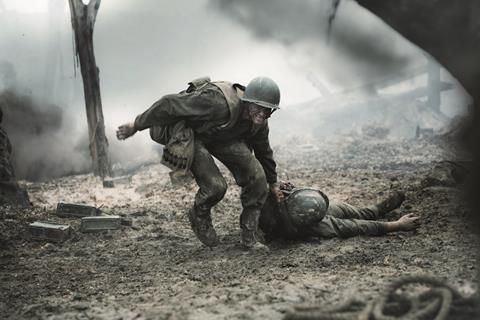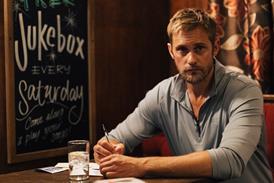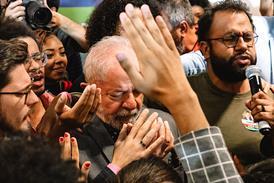Hacksaw Ridge screenwriter Robert Schenkkan talks to Jeremy Kay about why he believes the violent story of peace-loving war hero Desmond Doss is so relevant to our troubled times.

Even though his father had served in the Pacific during the Second World War, Robert Schenkkan, the Pulitzer Prize-winning playwright of The Kentucky Cycle, had not heard of Desmond Doss before he signed on to write Hacksaw Ridge, the film based on Doss’s life as a combat medic.
As a Seventh Day Adventist, Doss was the first conscientious objector to earn the Medal of Honor after he saved 75 men in the Battle of Okinawa.
“I was gobsmacked when I heard [about Doss’s story] and threw myself into a draft very quickly,” says Schenkkan.
He watched Terry Benedict’s documentary The Conscientious Objector, pored over regimental records and even found a US Army Medal of Honor comic book about Doss.
When Schenkkan joined the project in 2006 (Andrew Knight is a co-writer), the project was at Walden Media. “That was really the challenge because their mandate was family features and nothing over PG-13,” Schenkkan explains.
That stricture put off directors and it was not until producer Bill Mechanic took the project out of Walden Media that Mel Gibson signed on as director in 2014.
Family dynamics
The film is in two parts. “It has a kind of old-fashioned flavour about it,” says Schenkkan. “[Doss] really did grow up [in Virginia] in this kind of Norman Rockwell world, at least initially, and as you get into the dynamics of the family you see it’s a very troubled family.
“The father is clearly suffering from PTSD from his World War One experiences and was an alcoholic and quite abusive. You peel outside and see it was certainly a challenging childhood, but Desmond’s compassionate, good-humoured country boy comes out and that’s very honest and accurate.
“We play with the audience in the way we set this up and this charming courtship with Desmond’s future wife. And then we take you to battle.”

The war sequences as written on the page and subsequently realised on screen are some of the most brutal and immersive ever seen on film. Schenkkan was keen to show how Doss, played by Andrew Garfield, marched into the cauldron resolute in his beliefs.
“I don’t think you could tell the story of Desmond Doss and ignore his faith, his religious practice. It underwrote who he was,” the writer suggests.
At the same time, Doss’s courage in the field presented pitfalls. In real life the man, who died in 2006 before any of the film-makers could meet him, resisted any efforts at hagiography. Schenkkan was of the same mind.
“The trap here - and I worked very hard to avoid it - is to turn a character like this into a saint,” he says.
Schenkkan notes much of Doss’s heroism was rooted in his aversion towards carrying a weapon, which the soldier explains in a revelatory conversation with a comrade after a particularly fierce firefight.
“And the answer is that he’s afraid of his own violence. That, to me, was the key. So he’s not a saint at all. [He’s] very human, all too human. What drives Desmond in his core is the knowledge he has that virus within him and he’s doing everything he can to not respond to that prompt. That’s what makes him heroic.
“Desmond models an idea of masculinity that is very, very important, particularly in the time of Trump,” continues Schenkkan. “Desmond’s masculinity is not about aggression, it’s not about domination, it’s not about selfishness.
“It’s the antithesis of that - it’s about love. It’s about self-sacrifice and I can’t think of a more important message in this political era than the message of Desmond Doss.”























No comments yet